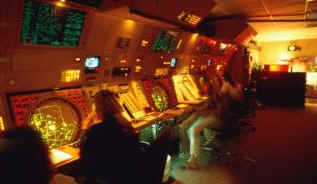| Types of system - A reminder! | ||
|
Batch Processing
One or more programs (together with any data needed) are submitted to the computer as a 'job' and put in a queue to await processing. The jobs may be prepared off-line or on computers not connected to the main computer where the jobs are run. The queue of jobs would be stored on a magnetic disc and the operating system would load each into memory when it is run. Output from each job would be sent to e.g. a printer or stored back on magnetic disc for later processing/printing. Example: A job might be a payroll run for a company together with all the time-sheet details of the workers for that week (hours worked, overtime etc). There is no interaction between user and computer. Processing can be done at off-peak times (e.g. overnight) as no interaction is needed. A JCL (Job Control Language) is used to give instructions for processing the jobs.
|
||
|
Single-user on-line systems...
- allow for interaction between user and job, to influence future processing. Example : Using a microcomputer for playing a computer game; word-processing;
|
||
|
Multi-user On-line systems (Multi-access
systems)
- allow a number of users to access a central computer interactively. (Careful...this is not the same as a network.) One of the jobs of the operating system is to control the flow of data to and from the workstations. Output needs to be sent back to the correct workstation! Example : students using terminals to run software on a central computer.
|
||
|
Real-time processing
A mode of operation where data received is immediately processed, stored data is updated and any necessary actions taken. Example : a computer guided missile; any control system
|
||
|
Real-time transaction processing
An on-line system in which individual, discrete transactions are processed as they occur. Example : an airline booking system; a supermarket stock control system. 'Real-time' basically means that if if you look at the state of the system at any instant it is up-to-date.
|
||
|
Multi-programming
A computer may store a number of different programs in its memory. Each stored program will receive a time-slice of processing time (typically about 1/50th second) in turn. This happens so fast that it seems that the computer is processing all programs simultaneously. In practice, most large on-line systems are a mixture of multi-access and multiprogramming systems.
|
||
| Multi-tasking
Generally applied to PCs...a number of tasks are loaded and processed in turn for short time-slices until completed. Example : On a PC you can have a number of windows open with different applications running in each.
|
||


